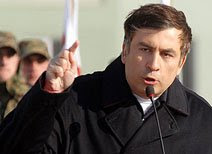
Yesterday's drama in Georgia is a reminder that the struggle for power and influence in Georgia could derail relations between Russia and Nato, and raises questions over European hopes that the region will become a secure energy supply route.
Georgia hosts strategic transit pipelines carrying Caspian oil and natural gas exports to the west. It is crucial to energy security in Europe, which is trying to reduce its dependence on Russian supplies.
The apparent mutiny, described at one stage by Georgia as an attempted coup, underlines the precarious position of Mikheil Saakashvili, the western-backed president, who many analysts say is unlikely to see out his four-year term.
His credibility was dented beyond repair by last August's disastrous war with Russia, which he was accused of starting and which resulted in the loss of the breakaway regions of South Ossetia and Abkhazia. Street protests against the president's rule have become a regular fixture since early April, and while yesterday's mutiny was shortlived it demonstrated how opposition to Mr Saakashvili may be spreading throughout the establishment.
Georgian officials said the Russian secret services were behind the plot, which was timed to coincide with the start of Nato military exercises in the country.
Moscow's interest in seeing Mr Saakashvili leave power is clear, though Russian officials rushed yesterday to deny Georgian claims that the Kremlin financed the "coup" attempt.
Dmitry Rogozin, Russia's Nato envoy, said the alliance's refusal to cancel the military exercises would "further provoke Georgia's downfall and could possibly destabilise the situation in neighbouring regions".
Andrei Klimov, deputy chairman of the committee for international relations in the state Duma, Russia's lower house of parliament, called yesterday's events a "show" made for western consumption, which would help Mr Saakashvili distract Georgians from opposition demonstrations that have become a regular fixture in the capital. "This is one of Saakashvili's tricks. He is a master of such shows," he said.
Alexander Rondeli, the head of the Georgian Foundation for Strategic and International Studies in Tbilisi, said the government needed to show evidence supporting its accusations against Russia and the alleged coup's ringleaders. But it was possible that the drama was at least partly inspired from Moscow, he added. "Russia is not just sitting on its hands and watching our country."
The situation in Georgia has put the administration of Barack Obama, US president, in a difficult position. Washington's support for Mr Saakashvili is a sticking point in an otherwise improving relationship with Moscow, underlined by a cordial meeting between Mr Obama and Dmitry Medvedev, the Russian president, in London in April.
The Obama administration insists it wants to "press the reset button" with Moscow. But relations were strained again last week when Moscow signed an agreement that, in effect, took control of the borders of Georgia's breakaway regions of South Ossetia and Abkhazia, a move that the US said was "another step in the wrong direction".
The military exercises due to take place in Georgia this week by countries involved in Nato's partnership for peace have also irked Russia, which sees them as a provocative action in a country it regards as under its sphere of influence.
Sergei Lavrov, Russia's foreign minister, yesterday pulled out of a meeting of the Nato-Russia council. He had been due to attend a meeting of foreign ministers on May 18, intended to cement improved relations between Russia and Nato.
The meeting would have looked at a range of security issues, including co-operation between Russia and Nato on Afghanistan and joint attempts to combat piracy off the coast of Somalia. Moscow told Nato diplomats Mr Lavrov's decision was a response to the defence alliance's move to expel two Russian diplomats in the aftermath of a spying scandal, as well as Nato's intention to hold military exercises in Georgia.
Mr Obama has little room for diplomatic manoeuvre. His overtures to Russia, along with other traditional enemies of the US, have attracted the ire of the US rightwing. Delaying the Georgia war games would be viewed as a concession to Russia, and might cost Mr Obama politically at home, a Washington-based analyst said. The US department of defence said the mutiny appeared to be an isolated incident but added it was monitoring the situation. "It doesn't change our long-term relationship with Georgia," the Pentagon said.
ft.com
No comments:
Post a Comment